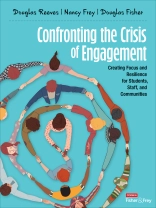Stop apathy in its tracks with the 5 C’s of engagement
Disengagement, disenchantment, distress—the three ‘D’s’ of many post-pandemic schools. If we are to find our way back from this brink, every student, teacher, and leader must relearn how to lean in. It’s time to focus, know one another, and stop chasing so many initiatives. It’s time to shake things up so learners want to participate.
From faculty meetings to student conferences, casual greetings to grading, you can learn to use practices that most powerfully reflect the Five C’s of Engagement:
Our students are looking to us as the grownups in the room to model what it looks like to belong, believe, and balance high expectations with compassionate support. With Confronting the Crisis of Engagement in hand, you have the guide to make that happen.
Tabela de Conteúdo
Introduction: The Engagement Imperative
Chapter 1 – Connections: Relationships Are Essential for Engagement
Chapter 2 – Conditions – High Expectations, Attendance, and Participation Are Necessary for Engagement
Chapter 3 – Challenge: Dealing with Struggle and Failure
Chapter 4 – Control: Increase Students’ Ownership of Their Own Engagement and Learning
Chapter 5 – Collaboration: Consolidating Understanding with Others
Chapter 6 – Leading for Engagement
References
Sobre o autor
Douglas Fisher is professor and chair of educational leadership at San Diego State University and a teacher leader at Health Sciences High and Middle College. Previously, Doug was an early intervention teacher and elementary school educator. He is a credentialed English teacher and administrator in California. In 2022, he was inducted into the Reading Hall of Fame by the Literacy Research Association. He has published numerous articles on reading and literacy, differentiated instruction, and curriculum design, as well as books such as The Teacher Clarity Playbook 2/e, Your Introduction to PLC+, The Illustrated Guide to Teacher Credibility, The Teaching Reading Playbook, and Welcome to Teaching!.












